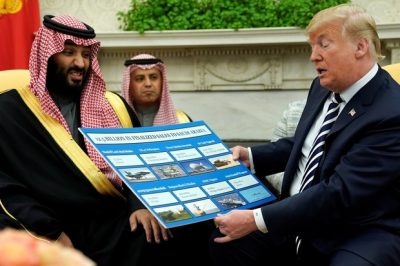Trump Regime Approves Sale of Sensitive Nuclear Technology to Saudis

Saudi nuclear power ambitions are well known. For months, the Trump and Saudi regimes have been negotiating the sale of US nuclear technology to the kingdom.
Anti-nuclear expert Helen Caldicott explained that any country operating nuclear power plants “can theoretically manufacture 40 (nuclear) bombs a year” by producing plutonium, the fuel for nukes.
According to nuclear security expert Matthew Fuhrmann,
“(a)ny nuclear technology could be used for legitimate civilian things like producing electricity or making medical isotopes to treat cancer patients, but that same technology can give countries the ability to make nuclear weapons,” adding:
“You always want to think about what the possibilities might be, that a country may try and use things that were provided for peaceful purposes down the road towards military ends.”
The US intelligence community is concerned about whether Riyadh’s interest in nuclear power plants goes beyond wanting another energy source.
Israel is the region’s only nuclear armed and dangerous state, its open secret revealed long ago. Giving ruthlessly dangerous Saudi crown prince/de facto ruler Mohammad bin Salman (MBS) access to technology able to produce nuclear weapons would be madness.
Earlier he said if Iran “developed a nuclear bomb, we will follow suit as soon as possible” – knowing the Islamic Republic abhors these weapons, wanting them eliminated.
According to the House Oversight and Reform Committee, Trump regime relations with the Saudis are “shrouded in secrecy,” Jared Kushner directly involved MBS. He once said he’s got Trump’s son-in-law “in his pocket.”
DLT, his children and Kushner prioritize wealth and power. Saudi Arabia is a super-wealthy family dictatorship masquerading as a nation state.
Trump has gone all-out to assure nothing interferes with US/Saudi business and political relations. He’s had longstanding business ties to the kingdom, including distress sales to royal family members when needing cash to meet debt obligations.
He pursues maximum Saudi revenues flowing to US corporate interests. The House Oversight and Reform Committee earlier said his regime is fast-tracking “the transfer of highly sensitive US nuclear technology” to the kingdom without required congressional review – in violation of the 1954 Atomic Energy Act, US law regulating civilian and military uses of nuclear material.
The NEA prohibits the transfer of US technology to another country if there’s a risk it can be used to develop nukes. The NEA’s Section 123 states that nuclear technology transfers abroad are subject to congressional approval.
According to Reuters,
“US Energy Secretary Rick Perry has approved six secret authorizations by companies to sell nuclear power technology and assistance to Saudi Arabia, according to a copy of a document seen by (the news service) on Wednesday,” adding:
“Perry’s approvals, known as Part 810 authorizations, allow companies to do preliminary work on nuclear power ahead of any deal, but not ship equipment that would go into a plant, a source with knowledge of the agreements said on condition of anonymity.”
A Department of Energy’s National Nuclear Security Administration (NNSA) statement said
“each of the companies which received a specific authorization for (Saudi Arabia) have provided us written request that their authorization be withheld from public release.”
During House Energy and Commerce Committee testimony, Mike Pompeo was accused of attempting to circumvent congressional control over nuclear technology sales to foreign nations.
Senators Bob Menendez and Marco Rubio asked the Government Accountability Office to review Energy Department negotiations with the Saudis to determine if federal laws were violated.
Last week, Bush/Cheney envoy to Saudi Arabia Robert Jordan said if the transfer of US nuclear technology to the kingdom “already occurred, or is being discussed, it’s likely in violation of the Atomic Energy Act section 123.”
It requires congressional approval for sales of nuclear technology to foreign governments – prohibiting use of the technology for development of nuclear weapons.
In dealing with a regime like the Saudis, its agreement to AEA section 123 won’t be worth the paper it’s written on. Like the US, NATO and Israel, the Saudis do whatever they please, defying rule of law principles.
The oil rich kingdom has no need for nuclear power as an energy source for its 33 million people. According to Fuhrmann, from its standpoint, it’s logical to believe the Saudis have a “strong strategic incentive to want nuclear weapons.”
The White House has been secretive about the kind of nuclear technology it seeks to sell the Saudis, noting it’s “highly sensitive,” the comment raising an obvious red flag.
As congressional approval is required for the sale or transfer of US nuclear technology to other countries, it’s up to its bipartisan leadership to block its sale to the Saudis.
*
Note to readers: please click the share buttons below. Forward this article to your email lists. Crosspost on your blog site, internet forums. etc.
Award-winning author Stephen Lendman lives in Chicago. He can be reached at [email protected]. He is a Research Associate of the Centre for Research on Globalization (CRG)
His new book as editor and contributor is titled “Flashpoint in Ukraine: US Drive for Hegemony Risks WW III.”
http://www.claritypress.com/LendmanIII.html
Visit his blog site at sjlendman.blogspot.com.

